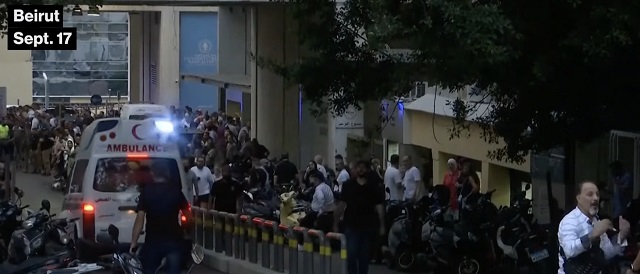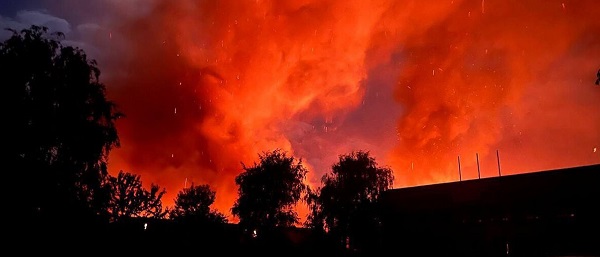conflict
Second Wave Of Blasts Sweep Through Lebanon As Hezbollah Walkie-Talkies Suddenly Explode

From the Daily Caller News Foundation
 By Jake Smith
By Jake Smith
A second wave of blasts swept through Lebanon on Wednesday as more communication devices used by Hezbollah suddenly exploded, according to several reports.
Hand-held radios used by Hezbollah terrorists abruptly exploded in southern Lebanon and the country’s capital of Beirut on Wednesday, according to Reuters. It marks yet another blow to Hezbollah, which the day prior had a large number of its terrorist fighters’ pager devices abruptly explode, causing thousands of injuries.
The devices that detonated on Wednesday appeared to be walkie-talkie devices rather than pagers, according to The Wall Street Journal. The exact size and scope of the attack are still unclear, but at least nine people have been killed and 300 have been injured, The Associated Press reported.
A #Hezbollah walkie talkie explodes at a funeral today in #Lebanon after yesterday’s exploding Hezbollah pagers. pic.twitter.com/b8TIfUUBKq
— Jason Brodsky (@JasonMBrodsky) September 18, 2024
Israel is believed to be behind the coordinated and remote attack on Tuesday, though that has not been confirmed by the Israeli or U.S. governments, according to multiple reports. Explosive devices were reportedly planted into the pagers before they made their way out of a supply and manufacturing chain — which initially was suspected to be in Taiwan — and were shipped to Hezbollah in recent months, according to American and other officials who spoke to The New York Times.
The Taiwanese company in question has denied that it produced the pagers, saying that they were manufactured under license by a company based in Hungary, according to Reuters.
The walkie-talkies that detonated on Wednesday were reportedly also shipped to Hezbollah in recent months, a security source told Reuters.
Significant damage appears to have been made to a motorcycle after a Hezbollah radio exploded. pic.twitter.com/57JfoWDmaQ
— Joe Truzman (@JoeTruzman) September 18, 2024
The official Lebanese news agency also reported that a number of home solar energy systems exploded in Beirut on Wednesday, though it’s unclear whether it was connected to the string of walkie-talkie detonations, according to multiple reports.
Hezbollah has frequently attacked Israel since Oct. 7, the date Hamas invaded Israel and killed roughly 1,200 people. The Hezbollah attacks have created a turbulent situation along the Israeli-Lebanese border and prompted Israeli forces to launch cross-border counterattacks.
Israeli Defense Minister Yoav Gallant reportedly told a U.S. envoy on Monday that the time for a diplomatic solution had “passed because Hezbollah continues to tie itself to Hamas and refuses to end the conflict,” according to Axios.
Artificial Intelligence
AI Drone ‘Swarms’ Unleashed On Ukraine Battlefields, Marking New Era Of Warfare


From the Daily Caller News Foundation
Artificial intelligence-powered drones are making their first appearances on the battlefield in the Russia-Ukraine war as warfare creeps closer to full automation.
In bombardments on Russian targets in the past year, Ukrainian drones acting in concert were able to independently determine where to strike without human input.
It’s the first battlefield use of AI “swarm” technology in a real-world environment, a senior Ukrainian official and Swarmer, the company who makes the software, told the Wall Street Journal in a Tuesday report. While drones have increasingly defined modern battlefields, swarms until now had been confined to testing rather than combat.
“You set the target and the drones do the rest,” Swarmer Chief Executive Serhii Kupriienko told the WSJ. “They work together, they adapt.”
So far, the Swarmer technology has been used hundreds of times to target Russia assets, but was first used a year ago to lay mines on the front, the Ukrainian official told the WSJ. The software has been tested with up to 25 drones at once, but is usually utilized with only three.
Kupriienko told the WSJ that he was preparing to test up to 100 drones at once with the linking software.
A common arrangement used on the battlefield includes one reconnaissance drone to scout out the target and two explosive drones delivering the payload on target, the official told the WSJ.
While Western nations such as the U.S., France and the United Kingdom are also pursuing drone swarm technology, they have not deployed swarm technology on the battlefield the way Ukraine has, according to the WSJ. Currently, autonomous weapons are not regulated by any international authority or binding agreement, but ethical concerns around the technology has led many to call for increased regulation of weapons like the Swarmer system.
The Ukrainian Ministry of Foreign Affairs did not immediately respond to the Daily Caller News Foundation’s request for comment.
conflict
Trump Pentagon Reportedly Blocking Ukraine From Firing Western Missiles Deep Into Russia


From the Daily Caller News Foundation
The Department of Defense has spent months blocking the Ukrainian military from using American and British-made missiles to hit targets deep inside Russia, The Wall Street Journal reported Sunday, citing unnamed U.S. officials.
Undersecretary of Defense for Policy Eldridge Colby reportedly designed the procedure to review requests to carry out the long-range strikes with weapons that are either of U.S. origin or that require American intelligence or use components provided by the U.S., according to the WSJ. Secretary of Defense Pete Hegseth reportedly has the final say on whether Ukrainian forces can use the MGM-140 ATACMS (Army Tactical Missile System) to hit targets in Russia.
The reported blocks on missile strikes coincides with a Trump administration effort to broker a peace deal between Russia and Ukraine. A Pentagon spokesperson declined to comment further on the matter.
BREAKING: President Vladimir Putin reacts to B-2 Flyover pic.twitter.com/1mzVn7DxlW
— Jack Poso 🇺🇸 (@JackPosobiec) August 15, 2025
The Biden administration allowed Ukraine to carry out strikes with ATACMS in November, weeks after President Donald Trump won the 2024 election, the New York Times reported. Trump criticized the move during a December interview with Time magazine.
“It’s crazy what’s taking place. It’s crazy,” Trump said. “I disagree very vehemently with sending missiles hundreds of miles into Russia. Why are we doing that? We’re just escalating this war and making it worse. That should not have been allowed to be done.”
Trump and Russian President Vladimir Putin met in Alaska on Aug. 15 for a summit meeting during which Trump sought to secure a cease-fire in Russia’s war with Ukraine. As Trump greeted Putin, a B-2A Spirit stealth bomber and several fighters carried out a flyover of Elmendorf Air Force Base.
Trump met with Ukrainian President Volodymyr Zelensky and major European leaders on Aug. 18 to update them on the summit.
In July, Trump reached an agreement with NATO where members of the alliance would purchase weapons, including MIM-104 Patriot surface-to-air missiles, and donate them to Ukraine.
-

 Business10 hours ago
Business10 hours agoHow convenient: Minnesota day care reports break-in, records gone
-

 Business1 day ago
Business1 day agoThe Real Reason Canada’s Health Care System Is Failing
-

 International10 hours ago
International10 hours agoTrump confirms first American land strike against Venezuelan narco networks
-

 Opinion1 day ago
Opinion1 day agoGlobally, 2025 had one of the lowest annual death rates from extreme weather in history
-

 Business1 day ago
Business1 day agoFederal funds FROZEN after massive fraud uncovered: Trump cuts off Minnesota child care money
-

 Business9 hours ago
Business9 hours agoThe great policy challenge for governments in Canada in 2026
-

 Addictions1 day ago
Addictions1 day agoCoffee, Nicotine, and the Politics of Acceptable Addiction
-

 Business1 day ago
Business1 day agoDark clouds loom over Canada’s economy in 2026




